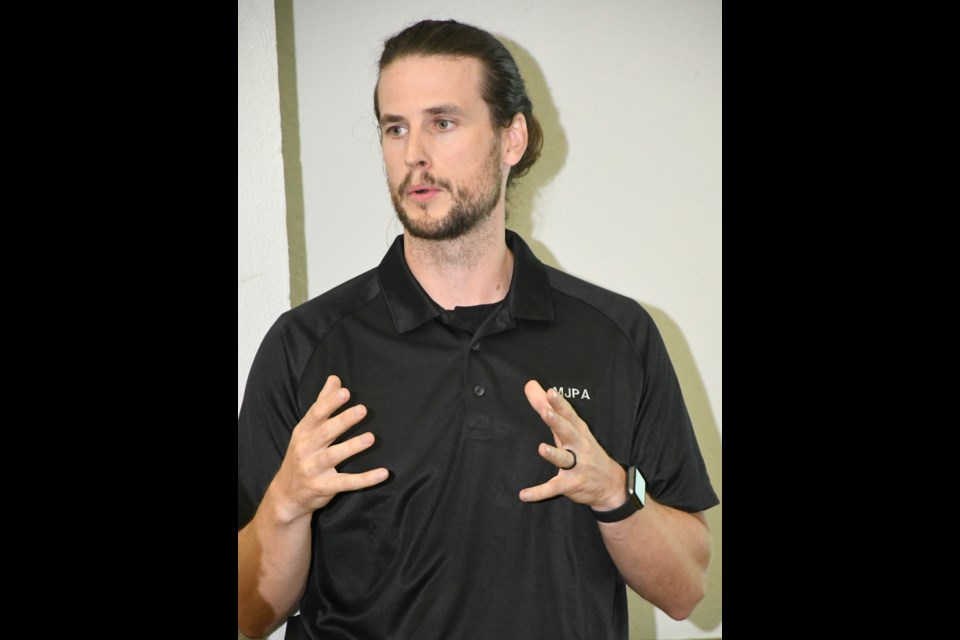MOOSE JAW — Local cop Const. Josh MacNaughton never thought he would ever work with the United States’ FBI or Europe’s Interpol, but it often occurs because he regularly investigates child pornography cases.
“The internet as a whole has no borders … . Most countries agree that child pornography is bad, so they’ve all collectively gotten on board saying ‘We don’t want to deal with all the jurisdictional red tape’ and created some streamlined things … ,” he said, “and I can send files directly across the world to get looked at.”
MacNaughton has been with the Moose Jaw Police Service’s internet child exploitation (ICE) unit for nearly two years and is one of two trained investigators. He spoke about the unit’s activities and child sexual exploitation materials in general during the Board of Police Commissioners’ recent June meeting.
Some organizations the investigator works with include the National Child Exploitation Co-ordination Centre (NCECC), CyberTips, the Federal Bureau of Investigations (FBI), Homeland Security, Interpol, internet service providers, and the National Centre for Missing and Exploited Children (NCMEC).
“So the network you need to have to do this job is huge. If you told me when I got into policing that I would talk to someone from the FBI, I’da been like, ‘No, that’s a pipe dream,’” MacNaughton chuckled. “But it’s happening now.”
The officer also emails Homeland Security weekly about social media posts with child porn, while that agency then commands the mostly California-based social media companies to remove the posts.
Provincial ICE unit
The provincial ice unit has existed since 2009 and is composed of one provincial co-ordinator and four investigators in Regina, three in Saskatoon, three in Prince Albert and two forensic technicians in Saskatoon, MacNaughton explained.
The unit has a 98-per-cent conviction rate in court.
“We are literally trying to disrupt the ease of finding child pornography on the internet and finding people who are accessing that,” he said, “and disrupting them and charging them and getting them off the streets.”
However, the province does not fund Moose Jaw’s ICE unit, which forces the agency to support its team with municipal dollars. However, the organization continually lobbies the government to include Moose Jaw because officers regularly encounter child porn.
A growing problem
The problem of child sexual exploitation continues to grow, with investigators seeing a trend of younger and younger victims, said MacNaughton.
The data shows 83 per cent of victims are younger than 12, 39 per cent are between three and five years old and 19 per cent are under age three.
Meanwhile, there are more than 40,000 chat sites defending adult-child sex; are over 14 million websites that depict sex with children; are an estimated 50,000 sexual predators online at any moment; and roughly 120,000 daily searches for child porn in Saskatchewan.
CyberTip also receives 80,000 daily reports, while NCMEC handles 32 million reports annually.
The Saskatchewan ICE unit’s case files have tripled during the past six years, going from 307 in 2017 to 931 last year, which means each investigator is responsible for an “intense” workload of about 100 files, MacNaughton said. Also, most cases take six months or more to solve.
In Moose Jaw last year, the unit handled 16 files, issued seven warrants, and charged three people. One person has been released, while two are still before the courts.
During one situation, police encountered a man with 1.7 million images on his computer, with 17,000 of those related to child porn, MacNaughton said. He was tasked with reviewing every image — which is why ICE investigators last only a couple of years because of the psychological stress.
The officer added that he has also investigated four cases of child sexual exploitation through the game Roblox, so parents should monitor their kids’ activities.
Said Police Chief Rick Bourassa afterwards, "It's a horrible thing that (this is) happening around us."
The next police board meeting is Thursday, July 6, at the Cultural Centre.




